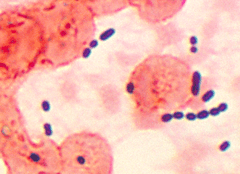Enterococcus facts for kids
Quick facts for kids Enterococcus |
|
|---|---|
 |
|
| Enterococcus sp. infection in lung tissue | |
| Scientific classification | |
| Kingdom: | |
| Division: | |
| Class: | |
| Order: | |
| Family: |
Enterococcaceae
|
| Genus: |
Enterococcus
|
Enterococcus is a genus of lactic acid bacteria of the phylum Firmicutes.
Enterococci are Gram-positive cocci that often occur in pairs or short chains. They look like streptococci. Two species are regular gut flora organisms in the intestines of humans: E. faecalis (90-95%) and E. faecium (5-10%).
Physiology and classification
Enterococci are "facultative anaerobic organisms". This means they can live in both oxygen-rich and oxygen-poor environments.
Members of the genus Enterococcus were classified as Group D Streptococcus until 1984. Genomic DNA analysis showed they were a separate genus.
Pathology
Important infections caused by Enterococcus include urinary tract infections, bacterial endocarditis, diverticulitis, and meningitis.
Sensitive strains of these bacteria can be treated with ampicillin, penicillin and vancomycin. Urinary tract infections can be treated by antibiotics, but many virulent strains of Enterococcus are resistant. From a medical standpoint, an important feature of this genus is the high level of intrinsic antibiotic resistance. This rules out some important antibiotics.
See also
 In Spanish: Enterococcus para niños
In Spanish: Enterococcus para niños

